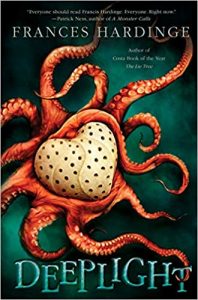Colleen Mondor Reviews Deeplight by Frances Hardinge
 Deeplight, Frances Hardinge (Macmillan Children’s Books 978-1-509-83695-6, £12.99, 448pp, hc) October 2019. (Abrams 978-1-419-74320-7, $19.99, 432pp, hc) April 2020.
Deeplight, Frances Hardinge (Macmillan Children’s Books 978-1-509-83695-6, £12.99, 448pp, hc) October 2019. (Abrams 978-1-419-74320-7, $19.99, 432pp, hc) April 2020.
Author Frances Hardinge’s latest fantasy, Deeplight, takes elements of Charles Dickens and Jules Verne and blends them into a world where the old and mysterious gods are now just carcasses in the depths of the sea, and a young teen must rely on his wits to survive. The adventures of 14-year-old orphan Hark, (equal parts Oliver Twist and the Artful Dodger with a bit of Pip thrown in), find him facing down not only monsters of the deep but also the secrets that have grown up around the long-dead religion that underpins his people’s society and economy. Relic-hunting is the most significant source of income in Hark’s world and everyone, from the government to an orphan, yearns for chunks of “godware.”
The text is populated with pirates and thieves, priests and politicians, and a scientist whose path to power lies right through Hark. In a nation of islands that mine the seas for dead god treasure, Hardinge demands to know how much you would risk for freedom. Also, and more importantly, she asks what anyone should endure for the truth when everyone else seems determined to play their own games no matter the cost.
Hark’s life on the island of Lady’s Crave is built around telling a good enough tale to persuade some much-needed funds out of the pockets of gullible tourists desperate to possess their own bits of godware. He gets by – he’s been getting by most of his life – and occasionally gets bullied into taking part in the schemes of his determined fellow orphan Jelt, who is always reaching for a big prize and is disturbingly willing to take chances with his life and Hark’s to get it. Early on they embark on a particularly fraught venture and Hark gets caught by the authorities and promptly auctioned off as an indentured servant as punishment. The woman with the winning bid is Dr. Magdala Vyne, curator of a godware museum on a nearby island. Hark is supposed to live and work in the island’s main facility, a retirement-type home for priests who have struggled ever since the gods massacred each other and ended religion 30 years earlier. Dr. Vyne has a secret reason to install Hark among the priests: she wants him to lull them into sharing their stories. Into this already somewhat precarious position Jelt arrives again to enlists Hark’s help (which means risking his life), and that’s when everything takes a most dramatic turn. Jelt nearly dies in an ill-thought deep dive using untrustworthy equipment, and Hark uses a recovered relic to save him. This starts a whole cascade of events that draws everyone into a spiral of action where all sorts of secrets will be revealed and Hark, of course, will be fighting to survive yet again.
It’s worth noting that the dramatic moment of saving Jelt occurs on page 114 of Deeplight and it is only then that the book truly transforms into a full blown fantasy-adventure. While Hark’s world has certainly been fictional up to that point, it is a fiction with enough elements of reality that readers may be lulled into thinking it is mostly a tale of a boy making his way in the world while fending off the destructive machinations of those around him. The glowing and powerful object from the depths of the sea changes all that and allows the plot to explode into the direction Hardinge always intended, and to take Hark along with it. This is Hardinge doing what she does so well: upending readerly expectations and tossing carefully scripted literary chaos about in her wake. Readers will thus find themselves suddenly enveloped by the vivid world the author has painstakingly created and fully onboard with the ever-more unexpected challenges Hark must face. That all of this began with a boy who wouldn’t have been out of place in the pages of Dickens or Verne, or even Robert Louis Stevenson, is just part of the book’s charm. With Deeplight, Hardinge has yet again surprised us, doing the thing this beguiling author has proven she is very good at. Simply put, Frances Hardinge takes readers to places they never imagined and she makes it look easy, which is the greatest trick any fantasy author can accomplish.
Colleen Mondor, Contributing Editor, is a writer, historian, and reviewer who co-owns an aircraft leasing company with her husband. She is the author of “The Map of My Dead Pilots: The Dangerous Game of Flying in Alaska” and reviews regularly for the ALA’s Booklist. Currently at work on a book about the 1932 Mt. McKinley Cosmic Ray Expedition, she and her family reside in the Pacific Northwest and Alaska. More info can be found on her website: www.colleenmondor.com.
This review and more like it in the September 2020 issue of Locus.
 While you are here, please take a moment to support Locus with a one-time or recurring donation. We rely on reader donations to keep the magazine and site going, and would like to keep the site paywall free, but WE NEED YOUR FINANCIAL SUPPORT to continue quality coverage of the science fiction and fantasy field.
While you are here, please take a moment to support Locus with a one-time or recurring donation. We rely on reader donations to keep the magazine and site going, and would like to keep the site paywall free, but WE NEED YOUR FINANCIAL SUPPORT to continue quality coverage of the science fiction and fantasy field.
©Locus Magazine. Copyrighted material may not be republished without permission of LSFF.





